
synerGy
Also in this issue
Shabana’s risky journey from Afghanistan to Lacombe
The Herr Lecture Series celebrating its 10th anniversary
School of Business collaborations
Newly available: art and music therapy specializations


Also in this issue
Shabana’s risky journey from Afghanistan to Lacombe
The Herr Lecture Series celebrating its 10th anniversary
School of Business collaborations
Newly available: art and music therapy specializations
EDITOR
Renate Krause
DESIGNER AND PHOTO EDITOR
David J. Kinsey, Alexander & Sydney, UBA
CONTRIBUTORS
Carole Anderson
Stephane Beaulieu
Carolyn Cave
Bronwyn Christison
Massiel Dávila-Ferrer
Adam Deibert
Hazel Flewwelling
Morris Flewwelling
Clark Jantzie
David Jeffrey
David Kinsey
Jr Ferrer
Adam Kiš ABOUT THE COVER
Pekka Määttänen
Maureen MacKenzie
John McDowell
Louicius Michel
Wendy Markosky
Wendolin Munroe
Ron Schafer
Sandy Stewart
Christina Sturgeon
Julie Thompson
Chloe Weir

There is nothing quite like “pitching in” to learn service values. There was wide agreement that the satifaction of helping others (and some really good pizza!) made up for the hard labour that was involved.
TO MAKE A GIFT
Gifts in support of Burman University may be made at www.burmanu.ca or phone 403.782.3381 x 4161.
VISIT US ONLINE AT www.burmanu.ca | Facebook: Burman University
Instagram: @burmanuniversity | Twitter: @burmanuniv
Over the years, community leader Morris Flewwelling and his wife Hazel have regularly attended the Herr Lecture Series and regard the programs as an important area resource. The Flewwellings join the multitude of area residents congratulating the founders on the 10th anniversary of the series. 10
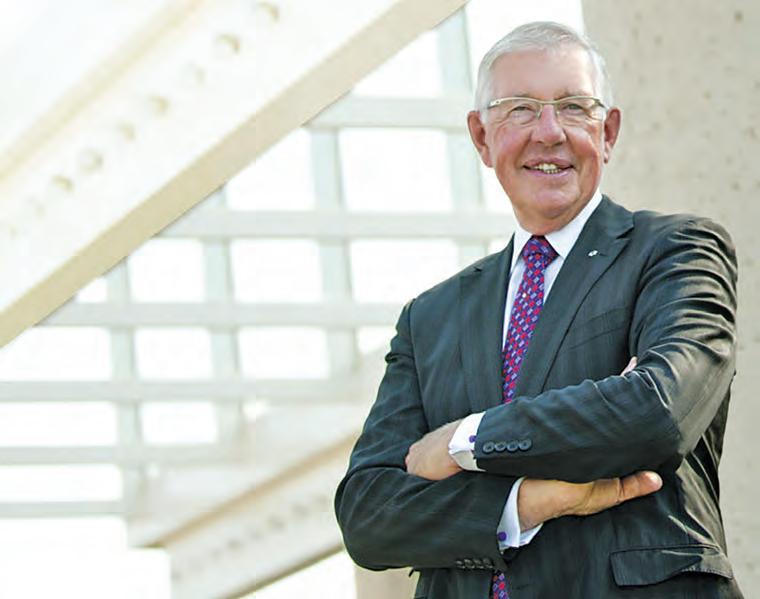
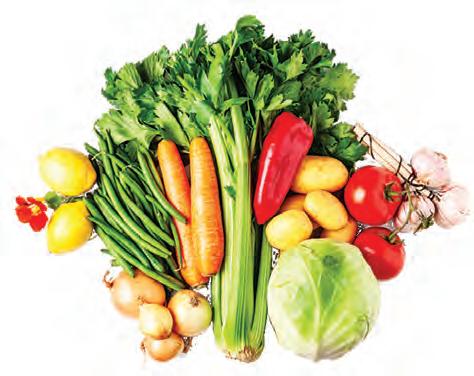
The Great Food Rescue
Volunteers help relieve community food insecurity by identifying sources of surplus food items and sharing them with Lacombe residents.
Tutoring: School of Education chair
Chloe Weir describes it as “win-win.”
Children from local schools benefit greatly and the same is true of the Burman tutors.


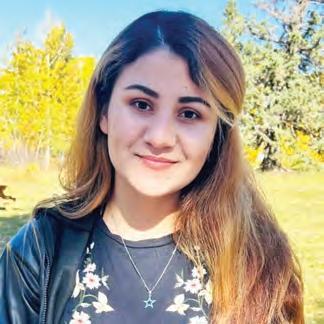
From Afghanistan to Pakistan to Canada, Shabana, alone and risking Taliban retaliation, made her way to Lacombe and Burman University after months of paperwork and determination. Assisted by Burman alumnus Eric Rajah, president of A Better World foundation, her journey is a testimony to what is possible with the help of people who care.
Sunday at 4 brings renowned national and international classical and folk/ world music performing artists to Central Alberta.
For now, she's well and a Burman freshman. But years of serious illness, coupled with an unrelenting positivity, have become a desire for helping sick children deal with pain and discouragement.
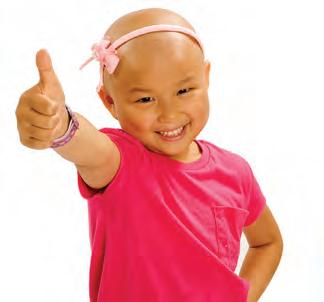
As incoming President in 2017, one of my goals was to enhance the university’s presence in the community. Many have shared my vision over these past seven years. With deliberate intentionality, we are achieving a dream that began long before I arrived.
Each year, it is more and more evident that Burman University, though small, is having a significant impact in our region. Last year, from September through April, the university was engaged with the community in more than 130 meaningful interactions.
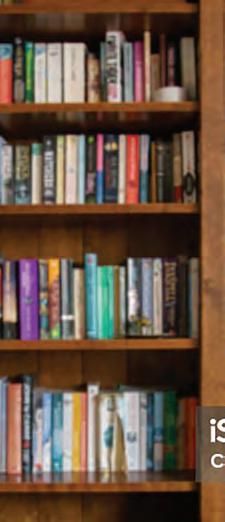
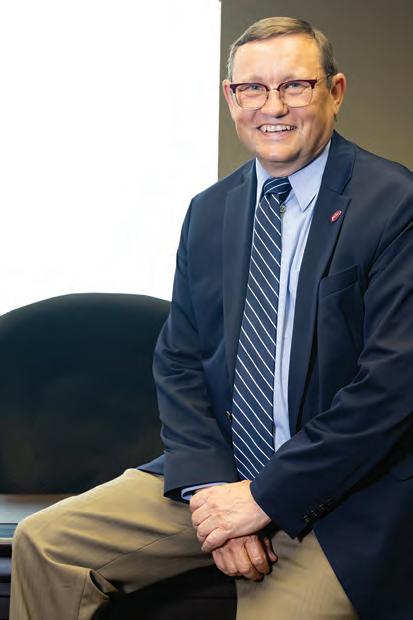
Learning together, working together, playing together, and making music together are building not only community, they are building friendship.
This issue of Burman University Magazine presents a few snapshots of these relationship-enhancing activities:
Learning together | One of our premiere presentations for the public is the Herr Lecture Series. The Centre for Peace and Justice invites worldclass presenters to speak before a packed house about the values of peace and justice. The School of Business also hosts lectures on topics such as entrepreneurship and marketing.
Working together | "Serve Lacombe," early in the academic year, is a day when students, faculty, and staff collectively set aside time for our community. But volunteerism is not confined to a single day. Throughout the year, campus members serve in various ways: assisting Echo Food Rescue, mentoring with Big Brothers and Big Sisters, volunteering at the Soup Kitchen, organizing activities at Mamawi Atosketan Native School, providing free tutoring for students in the area, and engaging with the community through internship programs.
Playing together | We also provide on-campus experiences for playing together. Our fitness centre is well-utilized. Seniors gather twice a week for morning fitness classes. Elementary and junior high school students on the Junior Acronaires teams develop confidence and physical stamina. Groups of avid pickleball players start their days with vigorous exercise.
Each summer, the Burman marketing team runs sports camps. One week features basketball; one, volleyball. These are only a few of the on-campus programs building positive relationships between the university and families in our community.
Celebrating music together | For over 50 years, Burman has nurtured a tradition of excellence in musical presentations. The Sunday at 4 series features world-class musicians, and the university’s Choral Union and Symphony Orchestra are well-loved also. The community choir, The Parkland Classical Singers, is a perfect venue for those who find joy in making music together.
I invite you to read about some of the ways Burman University makes a difference in Central Alberta. We are not content to be simply a presence on the hilltop; we want to foster a community of respect, trust, generosity, and friendship. Our goal is to be not only good neighbours, but good friends.


What sets Burman University apart from public universities? As a degree-granting university in the Province of Alberta, it is required—like other Alberta universities, including the UofA—to meet Campus Alberta Quality Council standards. Burman offers more than 35 major or track choices in its bachelor degree programs.
Although it is a very small Christian university, sponsored by the Seventh-day Adventist Church in Canada, it is one of 13 Adventist universities in North America and part of the world’s second largest Christian school system. Its student body is diverse with 37 countries and many faith communities represented.
One could also mention academic excellence and high standards, a highly-regarded faculty, and a robust research program. One could point to the university’s strong emphasis on service values and to opportunities for international experience in many curricula. Or one could talk about Burman’s numerous graduates who excelled in masters and doctoral programs at universities across Canada, and indeed, the world. All of the above make the student experience at Burman University unique. But none of these, individually or collectively, comprise “the difference with a difference.”
The primary difference that truly distinguishes the student experience is the worldview that is at the core of every Burman program and every Burman class. What does that mean? One professor, Dr. Pekka Määttänen, explains it this way:
“I am a biology professor. My worldview informs everything I do both inside and outside the classroom. It is founded on my identity as a child of God. I believe in the
The primary difference that truly distinguishes the student experience is the worldview that is at the core of every Burman program and every Burman class.

existence of a creator God and that every aspect of God’s creation is a glimpse into the mind of our Creator. It speaks of His masterful design and teaches us lessons about His plan of redemption and the principles through which He works.
“The main advantage of studying biology at a faith-based institution is that here the Creator is not divorced from His creation. I am blessed to be part of that and to share this good news with my students! To put it simply, my worldview motivates me to explore and foster each individual’s relationship to the divine. That context imbues a sense of personal mission and purpose. It is the basis for developing strong service values. And it reveals a pathway through the chaos and indifference of the wider world.”
Julie Thompson, an English professor, writes, “I seek to teach my students not only literature, but also to reflect on their own beliefs and convictions. Leading students to engage with their personal narratives and the course material fosters the interconnectivity of learning and spirituality.”
A professor in international studies, Dr. Adam Kiš, explains: “My students and I have more academic freedom here than what we might have elsewhere. The discussions we have would be impossible at a secular institution. We can engage in frank conversations about the variety of origin stories out there and the philosophy behind each one; one’s purpose in life, including the spiritual dimension; and how Christianity is practical and relevant to today’s world.”
Three Burman professors relate how their worldview is expressed in the classroom.
A Christian campus is decidedly different from a secular campus. For all students, including those who are not Seventh-day Adventist Christians, Burman provides a safe place to make friends, to examine and confirm beliefs, and to adopt an ethic of service that will help them navigate a very complex and confusing world.
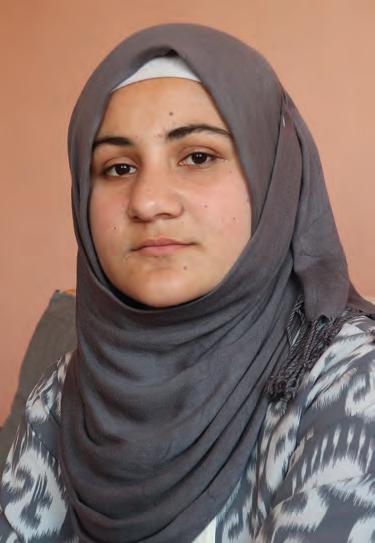
The Taliban, the Islamist nationalist group that had ruled from 1996—2001, returned to power in August 2021. While many feared and began to flee the country, Shabana stayed.
After graduating from university in 2022 with a degree in political science, she worked at a local television station until Taliban members started harassing her. They found her WhatsApp number and Facebook account. They wanted information about her job and affiliated political party. Then her manager was attacked. She was warned that if she ever worked again at the station or advocated for women’s education, she and her family would be harmed. She was certain that future graduating classes at her university would have no female students.
Twenty-two-year-old Shabana loves the big, beautiful Alberta sky.
Born in Afghanistan, she attended one of the many schools that the Lacombebased non-profit A Better World (ABW) had built there. Her school taught students from Grades 1to 12. These students were some of the fortunate ones. Most Afghani children, especially girls, do not learn to read and write, even in their own Persian language.
English was Shabana’s favourite subject—her golden ticket to achieving her dream: to represent her country as a diplomat, a United Nations post, or . . . her career possibilities would be endless.
Her parents were very proud of her, but when accounts of bombs in schools and terrorist incidents targeting educational institutions became more frequent, her mom begged her to stay home. But Shabana persevered. War had been a part of her life since birth.
In May 2019, Eric Rajah, co-founder of ABW, visited Afghanistan to evaluate the impact his schools were having. He knew that this trip would probably be his last for a while. Even then, he was required to travel with a dozen armed guards. But he wanted to meet some of his students. Shabana was among them. Fortunately, she tucked away his business card for future reference.
And she was right. Afghanistan now is the only country in the world where girls are banned from education beyond primary school, and women are banned from working outside their homes.
For years, Shabana had pursued her university education despite the daily threat of death. Now she could no longer work or study international law. She says, “It was a shock. I cried all night.” Then she remembered Rajah’s contact card and sent an email for help. She knew that leaving Afghanistan to live in another country would be challenging, but she refused to give up her dream. While Rajah began to search for solutions, Shabana visited his ABW schools, all still intact.
Then it was time to leave. Since embassies in Afghanistan had shut down, Shabana would need to travel to neighbouring Pakistan to apply for a student visa to Canada. She borrowed money from a relative to purchase an expensive visa off a street vendor to get into Pakistan. Women were not allowed to fly out of the country without a male chaperone, so Shabana persuaded her only brother to drive her to the border.
She recalls, “There were many Taliban at the border of Pakistan and Afghanistan, asking me where I was going, for what, and why I’m alone.” She told them that her husband was waiting for her across the border. Only then would they let her across.
For two months, she stayed in a hostel in Islamabad and waited for the required acceptance letter from a Canadian university.

In Canada, Rajah faced resistance from universities that did not accept credentials from Afghanistan. Finally, he appealed to Burman University, his alma mater. They agreed to offer Shabana a conditional acceptance letter into the business program. They hired an immigration consultant to handle paperwork, noting, however, that fewer than 10 per cent of student visa applications from Afghanistan are approved.
Two weeks before the first day of school, Shabana received her visa. Now she needed a direct flight from Pakistan to Canada since her visa would not be accepted in other countries. For three weeks, Rajah searched. Finally he found one. Shabana arrived in Edmonton a week into the Fall semester.
Shabana likes the quiet life at Burman. Although the university is Christianbased, she is free to practice her Islamic faith. She may never represent her country at organizations such as the United Nations, but she says she’s achieving something even greater: “Now I’m studying. I’m so happy. I feel safe. I feel freedom. I can work. I can reach my dreams. It feels so good!” Above all, Shabana feels deep gratitude for ABW, her professors, and Eric and Candi Rajah who have treated her like a daughter.
Rajah points to the grand generosity, commitment, and trust of donors, particularly in Central Alberta, that made all this possible.
Shabana’s journey from the visa to Pakistan to her arrival in Canada cost around $4,000. Her education is almost six times that per year. All is paid for by those who supported ABW projects in Afghanistan.
Although ABW schools are not serving as many girls as they once did, Rajah says he has no regrets. “We had a 14-year window to do something, and we did it. A whole generation of students graduated. They went to university. There is no regret when you invest in young people.”


The sky is what Shabana loves most about living in Lacombe, a simplicity in life the 22-year-old never takes for granted after escaping the Taliban rule in Afghanistan, all by herself.
There’s something about the Alberta sky. The morning sunrise that wakes with bright orange beams. The grey stormy clouds that swirl with cracks of lightening like tree branches. The cotton candy hues at sundown or the green northern lights on those lucky clear nights.
“Every day I take a picture of the sky, and I send it to my mom and say, ‘Look at that! How it’s beautiful!’ Every day it’s beautiful, the shape of the sky,” she says.
Meet Bronwyn Christison, a fun-loving, positive-energyradiating freshman at Burman University. When she’s not attending classes, she may be studying in the library, hanging out with friends, attending a leadership training session, participating in worship services, weight lifting in the gym, winter camping, snowboarding . . . in short, doing what Burman students do.
But all her other busyness is laid aside for one hour every Wednesday evening when Bronwyn facilitates and hosts a virtual hangout for families navigating childhood cancer and blood disorders, a program of West Coast Kids Cancer Foundation (WCK).
Bridging gaps and responding to the everchanging needs of families that are affected by cancer and blood disorders is what WCK is all about. Virtual hangouts are only one of several programs provided at no cost for families.
hours, she was struggling to breathe. Blood transfusions didn’t help. Fearful that she would die, the medical team airlifted her to Vancouver Children’s Hospital. Bronwyn’s parents clung to their faith in a loving God.
Bronwyn stayed with sometimes one, sometimes both, parents at Ronald MacDonald House for the first 15 months of her two-and-one-half year treatment protocol. They struggled to keep a positive outlook and accept the seemingly inevitable. And they kept turning to their God. But a world-wide search for a bonemarrow donor match turned up nothing.
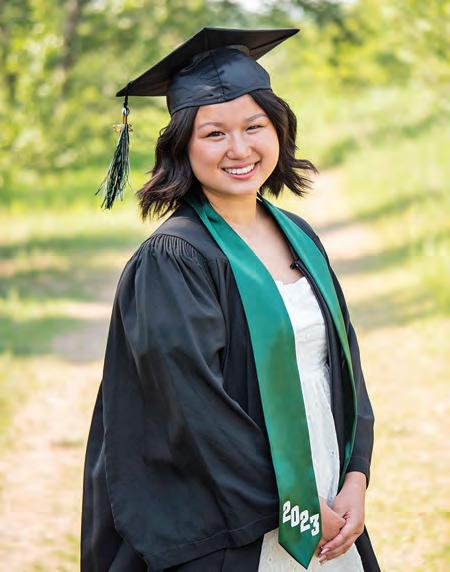
Bronwyn explains that the five- to 12-year-old patients and their siblings in her group need a space to connect and interact with each other. So she and her co-host organize scavenger hunts, listen to and tell stories, sing songs, play Simon Says and other kid games—all virtually.
The group gets to know each other well. They build social skills and provide emotional support for each other. Their sense of isolation (with all its accompanying anxieties) is lessened as they meet other kids who are “just like them.” And their family care-givers get one precious hour of respite. Bronwyn’s knowledge of what belonging to such a group can mean is very real and very personal.
When she was six years old, Bronwyn’s carefree, laughter-filled world suddenly became a world of pain. She was diagnosed with childhood acute lymphoblastic leukemia, a cancer of the blood and bone marrow, four days before Christmas—a time normally filled with joy and happy anticipation.
Bronwyn’s symptoms started with a slight fever. When she slept for two days, waking only long enough to eat occasionally, blood tests confirmed the diagnosis. Within

Between chemo treatments, Bronwyn went back home. Finally she was declared to be in remission. Her life returned to a semblance of normality. She caught up on schoolwork, continued violin lessons, played with friends. Everyone, including her physician, gathered to celebrate her 5-year milestone of being cancer-free.
Then the cancer came back. For the second time, Ronald MacDonald House became home. For the second time, she underwent extensive chemo treatments. (Only now, the dosage was much heavier.) And for the second time, she went into remission.
Cancer struck for the third time when Bronwyn was 16. This time, chemo was not an option, and the search for a bone marrow donor match continued to be unsuccessful. But one thing had changed: researchers had discovered and tested a new treatment in the intervening years. So, continuing to cling to their faith in God, the family flew to Toronto’s Sick Kids Hospital the summer of 2021. And the treatment worked!
Now a busy freshman at Burman University, Bronwyn takes time for other sick kids. Sharing her story at a student-led week of spiritual emphasis recently, she told her fellow students, “I am here. I have no say over how long. But I have a say over what I do. I am here!”


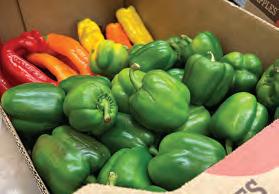
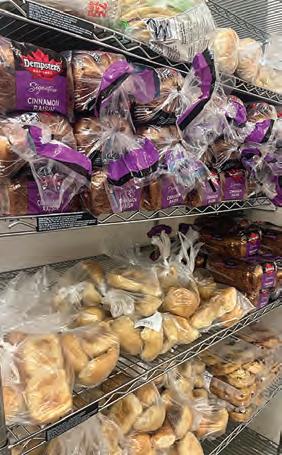
An initiative by the Chamber of Commerce, City of Lacombe, and Burman University
Registrar Dr. David Jeffrey, Burman’s representative on the Lacombe Echo Association board, is a founding organizer of its Food Rescue initiative. The association’s board members are a group of dedicated volunteers committed to “improve the quality of life within Lacombe by fostering a collaborative environment focused on . . . creating a safe, inclusive, vibrant, and healthy community.”
The Echo Food Rescue grew quickly. An estimated 80,000 pounds of food were rescued and distributed from July 2021 to June 2022. That total ballooned to 115,000 pounds last year, according to Christina Sturgeon, program manager and event organizer for the City of Lacombe. Between 150 to 200 people now benefit weekly. “But,” Ms. Sturgeon emphasizes, “we don’t look at it from a people perspective, only a food perspective.”
Rescuing food from landfills calls for pickups of overstocked, expired, or almost expired items from local grocery stores and restaurants three times each week. Then volunteers, including some Burman University students, sort it, set it up for public distribution, and also distribute it to all local schools and two retirement homes in Lacombe. One of the university’s dorms puts a box on its “sharing table” weekly for students to help themselves.
In addition, Echo Food Rescue opens its door every Thursday from 11:30 a.m. to 12:30 p.m. and every Sunday afternoon from 3:00 – 4:00. Ms. Sturgeon explains that through social media, people first became acquainted with the program. “Now they line up early,” she says. “My guess is that half of them really need it and the other half use it to avoid waste. We are not like the food bank in that we have fewer restrictions. Those that show up, can take whatever they can use.”
Christina Sturgeon, who has lived in the area for the past 10 years, shares a couple of her favourite stories: “Once, we had two van loads of chocolates donated. We advertised on Facebook and took them to the Chamber of Commerce’s trade show. People came from all over just to ‘rescue’ our chocolates. Another time, we were given a load of luscious, ripe strawberries. So we set up a booth at the Seniors Expo. It didn’t take long before they were gone. You can never have a bad day giving people food.”
Echo Lacombe Association keeps the doors open and pays the bills; other items require special funding. Recently Dr. Jeffrey assisted the Food Rescue by providing data for a grant application. The application to Farm Credit Canada resulted in an AgriSpirit grant that paid for a sink, some much-needed coolers, and even some paint and signage to “make the place more welcoming.” “We would love to collaborate even more with Burman,” says Ms. Sturgeon, “and welcome ideas to make this happen.”

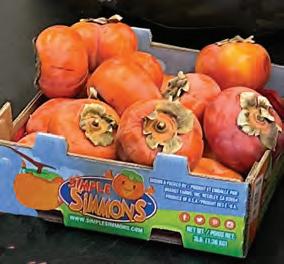

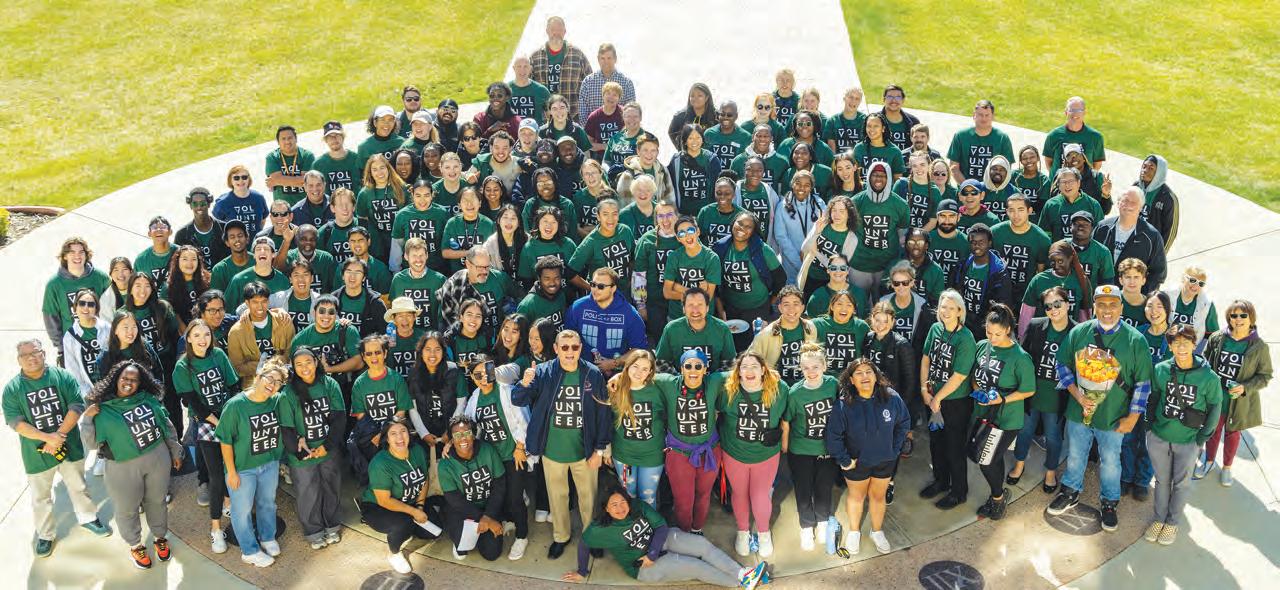
Maureen MacKenzie (City of Lacombe’s arts, culture, and cemetery coordinator) says she “loves working with Burman University students.” For the past five years, she has suggested projects for Burman’s Serve Lacombe day. And each year she is “impressed with how friendly, respectful, and polite the students are.”
Restoring Lacombe’s cemetery is high on Maureen’s list of priorities. So each year one group of students is asked to weed grave sites and clean headstones. Maureen chuckles, “When they first begin, I sense their uncertainty and even some aversion. But, always willing to do whatever is assigned, they take pails and brushes and start. Then, seeing the results of their work and beginning to understand the importance of remembering people and maintaining our history, they become enthusiastic. Quite often, some who are members of Burman’s choral groups start to sing together as they work. It’s beautiful to hear them in their happy place. They give with their hearts.”
Burman’s chaplain, Massiel Dávila-Ferrer, reports that planning for Service Day takes the efforts of everyone in the Student Services office long before “The Day” itself. “Leaning into the relationships we have with the Lacombe community,” she says, “we decide on various projects and locations for students to serve. Then we work on logistics, including advertising, sign-up sheets, transportation, food, supplies, and more. Eventually, the entire campus community is drawn in.”

Service Day 2023 saw more than 140 students, staff, and faculty meeting for a pizza lunch at noon, picking up t-shirts, and posing for a group picture. The pep-rally-like-energy and buzz were palpable on that sunny fall day. Before long, some boarded buses to go to various locations. Some traveled to Maskwacis (formerly Hobbema) to help at Mamawi Atosketan Native School with various projects that ranged from filling potholes, to digging the garden, to supporting teachers. Others stayed to make sandwiches on campus before delivering them to Red Deer’s homeless groups.
Throughout the afternoon, groups picked up trash, helped at the dog park, painted at Youth Unlimited, and visited seniors in Lacombe. One group went by the moniker “Traveling Minstrels” and visited two assisted living homes to bring music, cheer, and flowers. Another crew had signed up for clean-up along HWY 2A. Yet another (particularly hearty) crew partnered with the Bill Nielsen Trail Society and gave a huge swath of the Elizabeth Lake trail a fresh layer of mulch.
Sandy Stewart, Lacombe’s facility manager, points out that volunteerism makes for mental and physical well-being, is fulfilling, and creates connection and joy—all evident as the groups returned to campus that evening. Massiel writes, “After all the hard work, laughter, and smiles, we came back sunkissed and exhausted, swapping stories of the work we did, and sharing some last moments together over some gelato. All that hard work deserved a treat.”
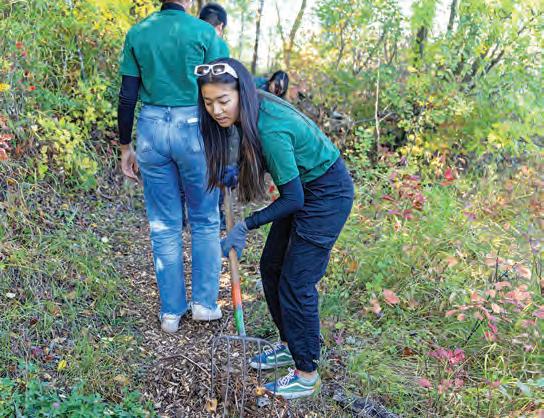
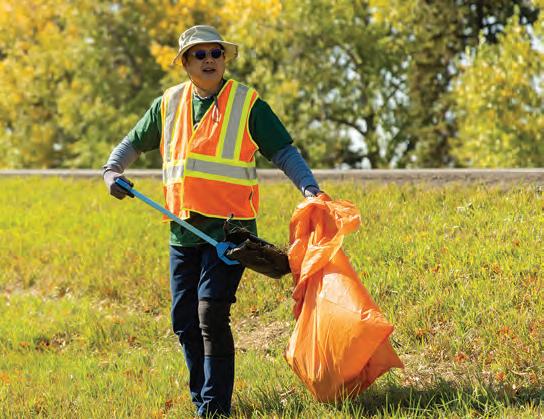
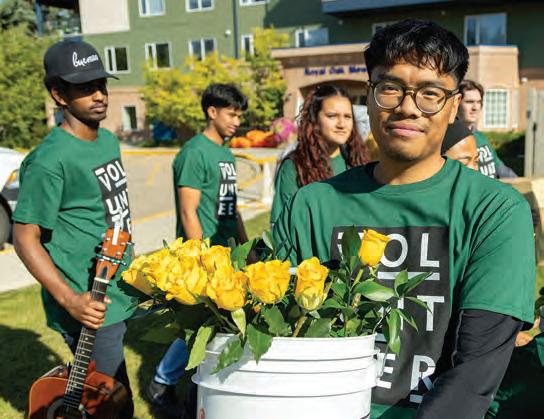
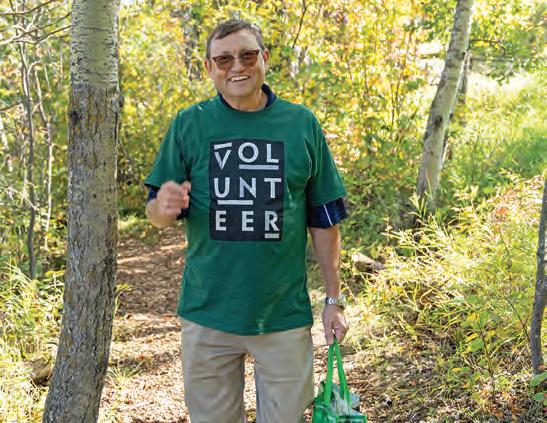


It must be true that with a few slices of pizza you can convince people to do most anything. Apparently with hundreds of slices, you can mobilize an entire student
The Denise and Larry Herr Lectures in the Humanities series is celebrating its10th anniversary. At its inception in 2014, cofounders Drs. Glen Graham and John McDowell wrote of their vision to create, at no cost to participants, “a format for community and university engagement that would give members of different faith groups and political persuasions opportunities to learn from each other and to practice a politics of inclusion and openness.”
HThe Flewwellings, two prominent community leaders, are part of a large group supporting the Herr Lectures enthusiastically.
Morris Flewwelling (mayor of Red Deer 2004-2013) and wife, Hazel, attend the Herr Lectures regularly. They describe the series as “show-and-tell for adults” and call it “one of Burman’s wonderful outreach programs for the Central Alberta community.” Morris explains, “When you see an audience of more than 500 people, you know that there is a need for people to ‘feed on ideas’ and to engage in person with the significant Canadian personalities behind them.” For an example, they point to Susan Aglukark’s presentation (March 27, 2023) and comment, “It was an absolutely delightful evening that captured the spirit of reconciliation so powerfully.”
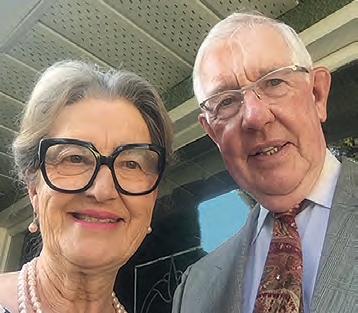
The Flewwellings have been residents of Red Deer since the early 1960s. Morris founded the voluntary, publicly-funded first Alternative High School program in Alberta. It focused on both academics and life skills.

Hazel, in the meantime, taught elementary and junior high students at the Red Deer Remand Centre for young offenders. She quips, “I went to jail every day.” Hazel’s next project was her “Outreach School,” an alternative program for senior high school students unable to attend regular classes.
Hazel retired for health reasons in 1997, and the Flewwellings started a small ranching operation. But their passion for education remained strong. They saw the need for a youth development program that would emphasize civic and religious leadership skills. So they created one. And, because Morris was on Red Deer’s City Council, the young participants were given the opportunity to share their youthful perspectives on issues such as homelessness with City Council members.
When Morris was appointed chairman of the Board of Governors at Red Deer College, now Red Deer Polytechnic, he worked tirelessly to meet provincial requirements for the college to achieve university status.
The Flewwellings remain passionate about education even in retirement. They support the Herr Lecture series with both their attendance and donations. Morris says, “We realize how valuable the lectures are to all. There is no admission charge, only free-will donations.” He concludes by simply saying, “Some may not be able to give, so we do our part.”
Throughout the years, the Herr Lectures roster has featured four presenters each year with a brief two-year hiatus prior to 2022/23. Audiences have packed Lacombe’s Memorial Centre to listen to and engage with renowned Canadian personalities. One such presenter was Douglas James Roche. Dr. Roche had been chairman of the United Nations Disarmament Committee, officer of the Order of Canada, president of the United Nations Association in Canada, and founding president of Parliamentarians for Global Action, an international network of 1,300 parliamentarians in 99 countries. He had long been concerned with nuclear disarmament, and the Vancouver Sun recognized his international influence by naming him Canada’s “most distinguished peacemaker” in 2011.
Kim Phuc’s story, on March 2019, also drew large crowds. She told her spell-bound audience of running naked down a road, her skin on fire with napalm . . . a story that was captured at the time by an Associated Press photographer who was later awarded a Pulitzer Prize for the photo that changed world perception of the Vietnam War in 1972. Against all odds, Kim Phuc survived and went on to become a renowned peace activist, author, UNESCO Goodwill Ambassador for the Culture of Peace, and founder of the Kim Phuc Foundation.
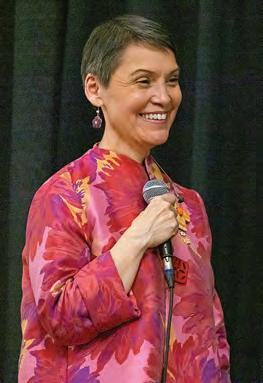
Another example of the invaluable forum for reasoned and informed discussion that the Herr Lectures provides in an age of extremism and widespread misinformation is the Susan Aglukark presentation on March 27, 2023. Through song and stories, this legendary Canadian singer shed light on some of the psychological and cultural impacts of rapid change in the North. She told of the resilience and determination of a people who have maintained a quiet dignity despite all—even near annihilation by disease.
The series’ 2023/24 roster of presenters featured Clara Hughes, a dual-season Olympic medalist in cycling and speed skating; philanthropist Eric Rajah; author and professor Marc Froese; and professor Stephen Martin.
Drs. Graham and McDowell explain that the series is named after Drs. Denise and Larry Herr because, “in their many years of service to Burman University, they always modeled the values of intellectual inquiry and engagement with the community.”
Editors note: We note with sadness the passing of Dr. Denise Herr on December 31, 2023 after a brief illness. Dr. John McDowell penned the following tribute to his colleague and friend:
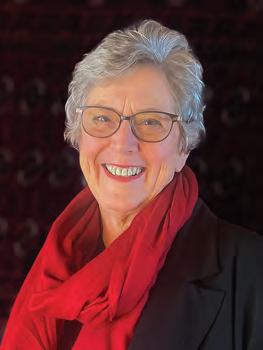
iDr. Denise Dick Herr energized Burman University’s English program and is remembered for her joie de vivre approach to life. Besides teaching and entertaining students with memorable Guy Fawkes parties (complete with fireworks), Denise loved the outdoors—cross-country skiing in Banff, or canoeing the Bowron Lakes. She also loved to travel, especially after her retirement in 2015.
Along with Dr. Larry Herr, she worked for many “dig” summers with an archeological team at Tal al-Umayri in Jordan. She made vital contributions to the success of the excavations by serving not only as square supervisor and pottery and object registrar, but also—with necessary good humour and patience—as quality controller of all implements, objects, and most importantly, the data collected during the dig.
Her enduring contribution to Burman was recognized in 2001 when she received the Honorary Alumnus Award.
Donations in honour of Dr. Denise Herr may be mailed to The Herr Lecture Series, Burman University, 6730 University Drive, Lacombe AB T4L 2E5 (payable to Burman University), or by phone 403.786.2533.
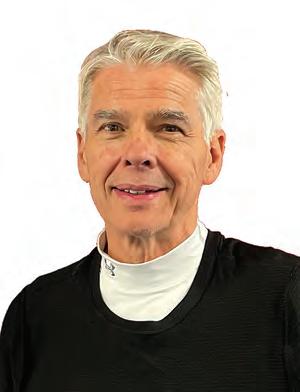
Clark Jantzie, long-time resident and Central Alberta pharmacist, is passionate about sports and health. He first came to the Burman University Physical Education Centre in 1980 for early-morning workouts in the pool. Since then, he has noted the many changes that have occurred.
These changes were not only physical ones such as the expansion of the weight training centre from 800 square feet to 11,000 square feet. They also involved the wider Lacombe community.
Mr. Jantzie observes, “Ron has always opened the doors to anyone interested in health and fitness. In addition to welcoming casual drop-ins, the Centre has many organized activities. For example, when I see 75 seniors come regularly twice every week for scheduled exercise classes during the course of a year to improve their quality of life, I see value. There are so many opportunities for improving health and wellness. Burman University is a hidden gem that many haven’t discovered yet.”
As for himself, Clark is not only swimming at the Burman PE Centre. He also uses the weight room. Over the years, he has played recreational racquetball, pickleball, badminton, and—just as importantly—he has built relationships and community. He says, “I recently met a couple of secondgeneration lifeguards. Their mother was lifeguard way back in the 90s.”
Sports have been a big part in Clark Jantzie’s life since childhood. In high school, he played with the Edmonton Oil Kings, a major junior ice hockey team that is part of the Western Hockey League. And at the University of Alberta in Edmonton, he was on the Golden Bears Hockey team. While playing university hockey, Clark was selected in the NHL amateur draft by the Washington Capitals. Clark says, “Nothing came of it, but it certainly was nice to be chosen.”

While Clark played at a high level of amateur sports in hockey, he was never a competitive swimmer—except briefly when his children were part of the Lacombe Dolphins Swim Club. Mainly he was one of the dads cheering from the sidelines.
At the age of 40, following the coach’s suggestion, Clark joined the Dolphins. This was so he could swim along with his family and also be available to swim on relay teams when needed. One year, his team made the Provincials and won a bronze medal. But only, he adds, because “we had three 17-year-old boys who were amazing swimmers.”
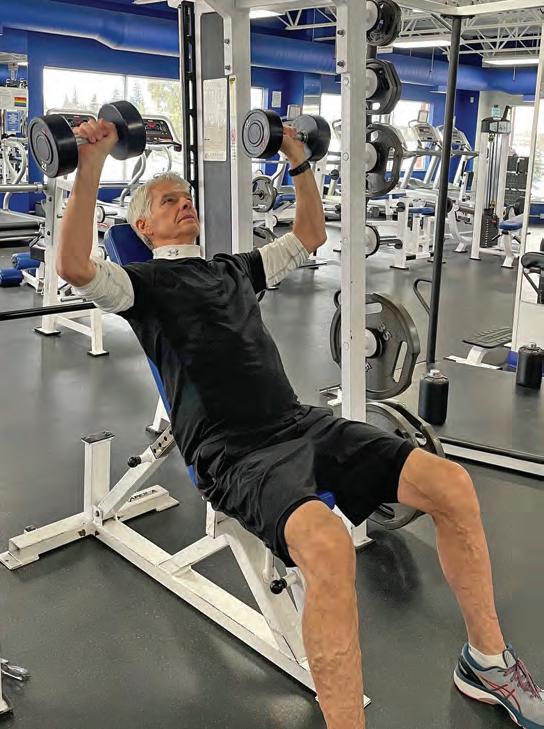
Now retired, Clark Jantzie is still working out at the PE Centre, but he is also taking advantage of other doors Burman University has opened to the community. He enrolled in university courses offered at no cost to seniors and has taken a philosophy class, a Canadian history class, an economics class, and a number of art courses. He explains, “I wanted to get out of my comfort zone and try something new. The staff is very supportive and the professors are excellent.”
For Clark Jantzie, discovering the “hidden gem” that is Burman University has resulted in many opportunities and benefits.
Burman University’s Physical Education Centre is a busy place. At 4:45 a.m., a student worker opens the doors to those choosing to get a workout before starting their workdays. So it’s critical to open on time for an hour-long workout, shower, and (for some) travel time to Red Deer.
Then the lifeguard arrives to do water tests and prepare for a busy day: public lap swim, aquacise, pool activities for special needs swimmers, the Lacombe Dolphins swim team, and Swim for Life (formerly Red Cross classes).
Monday through Friday mornings at 5:30, pickleball players come for their daily “fix” of this fastest- growing sport in North America. Another pickleball group plays from 9:00 to 11:00 a.m. And on Monday evenings, the Lacombe Pickleball Club fills the Physical Education Centre with players of all skill levels.

Fitness Centre, but many also come to the gymnasium— especially on Tuesdays and Thursdays from 9:45 – 11:00 a.m. when 60 - 90 seniors take advantage of the group exercise session offered at no charge.
Throughout the day, university physical education classes meet in the pool, gymnasium, racquetball court, and fitness centre. Parkview Adventist Academy (PAA) and College Heights Christian School (CHCS) often use the facilities even though they both have gyms of their own. Their enhanced physical education and athletic programs require more space, and Burman is happy to accommodate them.
Every evening, many Burman students arrive, especially for fitness training. Ron says, “The Gwen Bader Centre is large enough and has plenty of equipment to accommodate all, including those from the local community.”
Burman athletic teams practice and play in the evenings, as do two badminton clubs and the pickleball club. The gym is also rented to local baseball and lacrosse teams during spring training and try-outs.

Ron Schafer reports, “We received an interesting phone call recently from a Red Deer private school. They intend to use our pool rather than Red Deer’s public ones because apparently women can now swim topless there. We assured them that our pool still requires ladies to wear bathing suits. Times have changed!”
Throughout the day, a steady flow of people comes and goes. Most public patrons come for workouts in the Gwen Bader
A short distance away is Burman’s second physical activities facility. Many children and adults learn gymnastics, tumbling, acrobatics, and more at the Acro Centre. While this space is available for Burman, PAA, and CHCS classes throughout the day, from 3:45 p.m. until almost midnight, people are flipping, rolling, diving, and stacking themselves on each other.
The Physical Education Centre staff pack a lot into each day. In doing so, they generate funds to help operate the facilities. “But,” Director Schafer says, “perhaps even more importantly, for the past 40 years we have built good relations with our friends in Lacombe and the surrounding communities.”
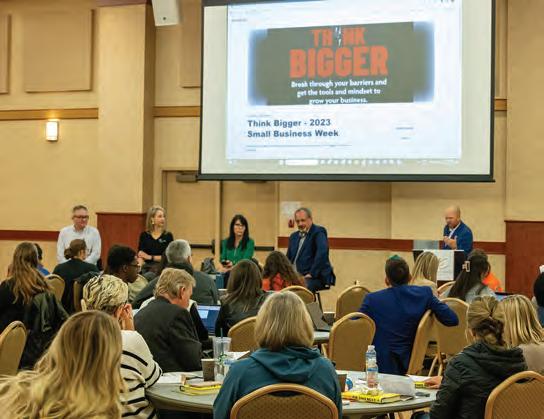
Synergy promotes better communication, reducing conflicts and enhancing cohesion. It boosts morale and job satisfaction, contributing to lower turnover rates. Ultimately, synergy allows teams to tackle complex challenges more efficiently and produce higher-quality results.

Throughout the morning, participants had opportunities to exchange ideas and discuss problem-solving strategies.
It’s all about synergy for success. Both the Burman University School of Business and the Lacombe and District Chamber of Commerce have a deeply vested interest in promoting and assisting entrepreneurship in Central Alberta. The School seeks to provide valuable experiential learning opportunities for its students. And the primary goal of the Chamber is to engage with its members, to assist them with maximizing their potential, and to cultivate strong relationships within the business community.
Burman plays a key role in Small Business Week workshop
What could be more natural than committed collaboration between these two entities? One result of such collaboration is the highly effective annual Small Business Week.
Two other post-secondary institutions, the City of Lacombe, and several local businesses have joined the School and the Chamber in this initiative. Over the past five years, they have worked together to promote Lacombe and surrounding area businesses. In 2022, for instance, the School provided several breakfast and lunch seminars on a variety of topics ranging from “How to Grow Your Business,” to “Women Entrepreneurship,” to “Managing Change Effectively.”
At the 2023 Small Business Week, the School of Business hosted “Think Bigger,” a 5-hour workshop. Sponsored by the City of Lacombe, Business Link, Lacombe Ford, Servus Credit Union, Edge Marketing, and the Chamber of Commerce, the workshop aimed at helping participants “break through your barriers and get the tools and mindset to grow your business.”
On the morning of October 17, 44 business representatives from the community and 37 students gathered in the Lacombe Memorial Centre to be energized by keynote speaker Craig Elias, the recipient of the World Federation of Colleges and Polytechnics Gold Award of Excellence in Entrepreneurship. Mr. Elias’s first startup went from its initial launch to being funded by a tier 1 US-based Venture Capitalist. It was named twice by Dow Jones as one of the 50 most promising companies in North America in less than 24 months after launching.

Following the keynote address, two workshops offered handson participation: one focused on professional branding; the second, on understanding customers.

Refreshment breaks notwithstanding, debating the ideas presented by the experts continued unabated.
The last presentation featured a panel discussion moderated by Joe Whitbread, owner of Jo(e) Social Media. Participants Darren Gagnon (CEO, Lacombe Ford), Thalia Hibbs (councillor, City of Lacombe), Matt Hill (director of operations, Business Link), and Lisa Vornbrock (branch manager, Servus Credit Union) shared experiences, insights, challenges, and opportunities in growing a business.
“It’s all part of the School of Business’s vision to engage with the local business community,” said Dr. Louicius Michel, Burman University’s chair of business. “When an academic community, a business community, and government agencies collaborate for the benefit of small businesses in our community, the resulting synergy makes all of us better.”
T
19, 2024.
• Mr. Darren Gagnon, CEO of L.A.N.D. Automotive Group LTD
• Mr. Don Gullekson, city councillor
• Mrs. Jennifer Hartigh, a regional economic development specialist for Alberta’s central region
• Miss Breeann Burghardt, manager of the Financial Administration and Operations Financial Services Branch, Government of Alberta
Local businesses collaborate with the School of Business by providing internship placements for Burman students.
These have included such organizations as Spyder Controls Corporation, BDO, Pivotal LLP Chartered Professional Accountants, 403MX, Advanced Systems, Rowland Parker, Sherwood Care, and Alberta Conference of Seventh-day Adventists. These partnerships with businesses, government agencies, and nonprofits are essential for such a program to succeed—not for students only, but also for the organizations involved.

The university’s internship program provides business students with opportunities for acquiring practical work experience in their chosen field of study.
The school’s basic goal is to challenge its students to integrate their academic training with practical experience. These learning experiences enhance students’ motivation, selfconfidence, and maturity while allowing them to develop specific work skills.
Businesses consider interns a vital part of the work place with the expectation that they will contribute meaningfully to the business functions of the site. Furthermore, employers have found that business graduates with internship experience often fit into the workplace with more ease, greater confidence, and more refined skill sets.
Under the supervision and guidance of both a faculty coordinator and a site director, interns work a minimum of 10 hours each week for a total of 12 weeks in an approved business that is closely related to their individual career goals. An intern can bring value to a company by bringing a fresh perspective to the business, by freeing up time when he or she is assigned to low-level or non-urgent projects, and more. A student’s benefits are also many. Not least among them is forging early career connections with professionals they would never meet in their classrooms.

urman University’s no-charge tutoring program in reading and mathematics is available to all schools in the local area. Each year, the School of Education sends invitations to schools and parents to register their children. The program is becoming so popular that some parents start calling to register in September, five months before the program begins, to secure a place for their children.
The seven-week tutoring program is a major component of Dr. Chloe Weir’s elective course “Remediation in Math and Reading.” During the first six weeks of the winter semester, her students learn techniques of remediation. Over the balance of the semester, they learn to apply the techniques as they work with young learners ranging between the ages of six and 14.


Dr. Weir says, “This program is a win-win for all concerned. Preservice teachers get an opportunity to put theory to practice when they tutor students. They provide instruction at different grade levels, and this prepares them for their first practicum. Furthermore, they assess students’ learning and adapt lessons to meet their needs. It is also a wonderful opportunity for the tutors to learn and practice behaviour modification strategies. The community benefits as we help young students develop critical skills for success in math and reading.”

This year, Dr. Weir’s 16 students started working with their 22 young clients on February 27. Their first session consisted of introductions. The parents and children met the tutors and their professor. And then the work began. Over the course of seven weeks, tutors assess needs and provide instruction under Dr. Weir’s supervision. They develop lesson plans and select materials appropriate to each child. They also assist children with homework assignments.
Because attention spans are short, each one-hour session includes a short snack break. And at the end of the term, the School of Education will host a pizza party for the children and their tutors to celebrate their successes.

The tutoring program is only one of the ways by which the School of Education engages with the community. Others include partnering with local school divisions for practicum and field experience placements for Burman students, hosting an annual Education Fair for representatives from 10 school divisions to meet with and interview preservice students, and inviting individuals from Central Alberta and beyond to provide professional development sessions on campus. The student-led Educators’ Guild also invites professionals from around Alberta to discuss issues on relevant topics with students.
Burman University’s School of Education is eager to engage with the community on as many levels as possible to continue building and fostering positive relationships.
Alyssa Letaba, a student in the two-year After Degree Program, writes, “My tutoring experience was wonderful. It preceded my first practicum, so I found it to be extremely beneficial. It gave me the opportunity to plan appropriately based on my tutees needs and to find ways to teach specific lessons and skills. It required me to be professional, punctual, organized, flexible, adaptable, patient, and willing to take the initiative. This is an amazing experience that I would recommend to anyone and everyone who is on the road to becoming a teacher. It is something unforgettable: a positive, beneficial learning experience.”
Another student, Katelyn Litwin, a senior education major, comments, “Tutoring made me realize the importance of being flexible. The things I had planned would sometimes not work, so I would have to change on the fly. It was beneficial to see the importance of building relationships with your student so they have confidence in you and in their ability to succeed.”
An elementary education major in his fourth year, Rohvoy Williams maintains, “I have learned that tutoring can be fun and a new adventure, especially when the tutor gets to know his tutees and considers their interests. I learned that students need to be taught in ways they enjoy; and I found that through motivation and enjoyable tasks, a student will much rather do the assignment than not.”
Shantel McArthor, another elementary education major in her last year, adds, “The most important thing I learned about tutoring is that you have to adapt to every student’s learning needs. It was beneficial to me to see them progress through every lesson and observe different learning styles.”
“Tutoring through the Burman University School of Education has been beneficial for my kids. It has added that ‘little something extra’ to help my kids develop the skills needed to be more confident in math and reading. My son struggled with math, and his tutor made it fun and interactive so that he was excited about being there.”
(Mandy Dubyna)"The tutoring program offered by Burman School of Education greatly helped my son. The setting was nonintimidating, and my son felt at ease with his tutor. He eagerly anticipated his Tuesday and Thursday sessions, displaying a consistently positive attitude throughout the entire experience. The tutor took note of his interests and selected relevant books, focusing on skill development and reinforcement. I am very pleased with the tutoring initiative."
(Dadria Lewis)An exciting benefit for you as a Burman graduate!

Take advantage of your alumni benefits!
You have access to the TD Insurance Meloche Monnex program. This means you can get preferred insurance rates on a wide range of home, condo, renters, and car coverage that can be customized.
For over 65 years, TD Insurance has been helping Canadians find quality insurance solutions.
Feel confident your coverage fits your needs. You save with preferred insurance rates. Get a quote now.
Get a quote and see how much you could save! Call 1-888-589-5656 or go to tdinsurance. com/burman.

The evening that Carolyn Cave attended a concert on the campus of Burman University was a momentous one: she introduced herself to Dr. Wendolin Munroe, a professor of music at the university. As Carolyn reflects on that first meeting, she muses, “We talked about our passion for music and my desire to start a community choir. To my surprise, Dr. Munroe enthusiastically encouraged me. She confided that she, too, had thought of doing that. Many talks later, we co-founded the Parkland Classical Singers.”
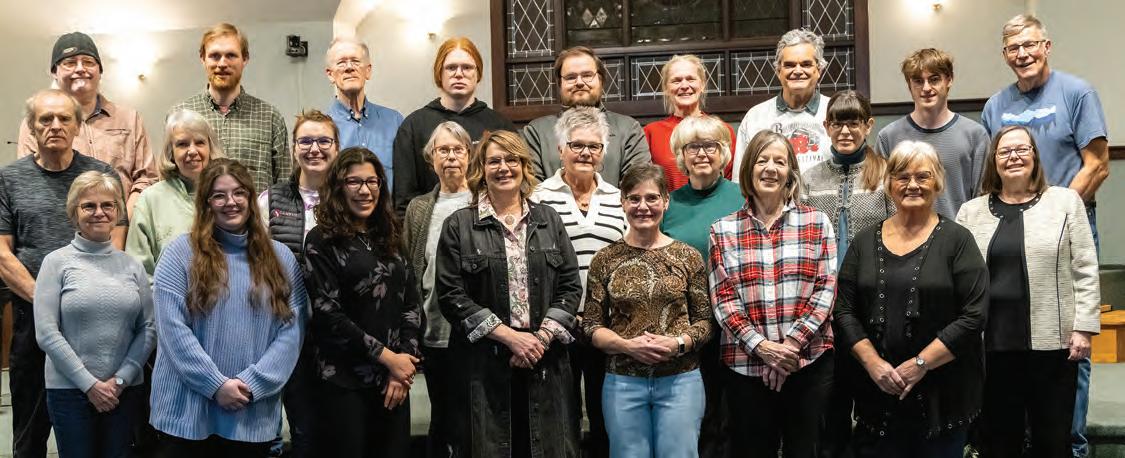
Over the past 17 years, 30 to 35 choir members have met every Thursday evening to share their love for music and enjoy the warmth of social connection that a shared passion can generate so readily.
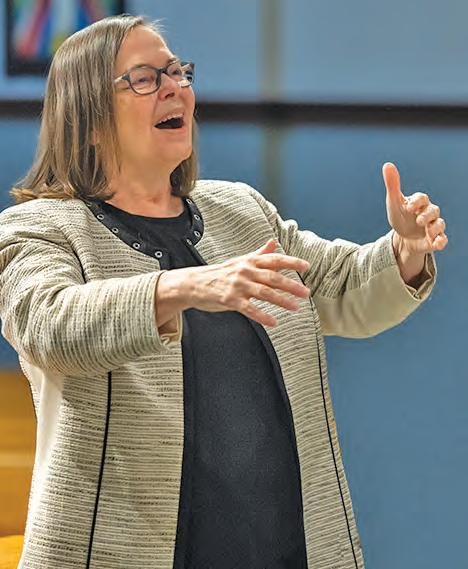
In early September 2007, the two new partners auditioned the singers that were interested in joining, and Dr. Munroe conducted the group until February. She had to step aside for a while to fundraise and prepare the music for the Burman University Choral Union’s choir tour to Beijing, China in honour of the Beijing Olympics during the summer of 2008. Then they carried on together again. Carolyn says, “Dr. Munroe is one of Canada’s top choral conductors. We are very fortunate to have her share her expertise with us.”
The Cave family had immigrated from Australia in 2006. They had been attracted by Alberta’s booming economy and had explored settling in Red Deer. But they discovered Lacombe to be better suited to their family’s requirements. (“A happy choice,” Carolyn says now.)
In Australia, Carolyn had been deeply involved with music. She had accompanied a choral group that she later directed. Now settled in Lacombe, she is enjoying a “vibrant musical life” that, she says, is at least in part due to Burman University and Dr. Munroe. Carolyn plays her cello in BU’s orchestra. She also accompanies Veritas with Dr. Munroe conducting this choral group of her former voice and choir students.
As for the Parkland Classical Singers, Jane McDonald, a retired music teacher and long-time member of the Singers, says, “In this group, you don’t have to belong to a congregation to sing in a choir. There are no qualifiers, except that you want to sing. And singing together makes for great comradery.”
While most of the singers are retired, the group also includes younger ones. For instance, one dad is bringing his two teen-aged sons this year. Moms have brought

daughters; and grandmothers, grandchildren. Over the past six or seven years, Dr. Munroe has influenced some of her music students to become members as well. Regardless of age, the group’s love of music and singing unites them. So does the thrill of performing at community events such as the Lacombe Rotary Carol Festival each December.

Wendolin and Carolyn share responsibilities: Wendolin conducts the weekly rehearsals and concerts and selects the music after the year’s theme is chosen. Carolyn is the accompanist and acts as the CEO and communications person. Many of the themes have had a regional emphasis. Songs from Atlantic Canada, Music from Great Britain (their concluding “high tea’—resplendent with scones and other British goodies—is still a vivid memory), and A European Panorama were some favourites. Each theme is a mix of sacred and secular music.
Wendolin says, “Carolyn and I have had so much fun over the past 17 years and have become great friends.“ Carolyn agrees and adds, “I love the partnership we have through the university. It’s so community building; so worthwhile!”
music performing artists to the campus, the City of Lacombe, and the wider Central Alberta community.
The 2023/24 program began with the Ensemble Phoenix Munich, founded in Munich, Germany. The group’s repertoire includes music from the 16th century to the present. It has performed at leading international festivals, has recorded four successful CDs, and now records with SONY/DHM.
On November 26, Lacombe’s concert lovers immersed themselves in an incredible evening of brilliant musical virtuosity by composer J.S. Bach and internationally renowned pianist Roman Rabinovitch. Rabinovitch performed Bach’s epic Goldberg Variations in their entirety on the university’s beautiful Steinway 9-foot concert grand piano.
The third performance of the Sunday at 4 concert series on January 28 featured Helen Hassinger, soprano, and Matthew Whitfield, piano, organ, and harpsichord. Ms. Hassinger, a Wisconsin native, has appeared in solo concerts and many operatic roles to enthusiastic reviews. Mr. Whitfield, formerly organist and director of music at St. Thomas’s Huron Street, Toronto, is currently the marketing and community connections coordinator at Red Deer Symphony Orchestra.

Sunday at 7 (now renamed Sunday at 4) is the progeny of Dr. Curtis Wolfe and Dr. Charles Pierce of Burman University (at the time, Canadian Union College). Fifty years ago, their combined enthusiasm for exceptional music brought people together for a common purpose: to celebrate and grow their appreciation of music.
Now half a century later, Sunday at 4 has matured into an eclectic professional concert series. Organized by Dr. Wendy Markosky for the last 20 years, the series has brought renowned national and international classical and folk/world
Duo Majoya, a Canadian organ-piano duo, presented the last performance of the 23/24 series on March 17. Organist Marnie Giesbrecht is professor emerita at the University of Alberta. She is an acclaimed international musician. Pianist Joachim Segger is chair and professor of music at The King’s University in Edmonton. Together, their technical bravura and enthusiasm captivated their diverse audience.
Information on next season's performing artists will be available on the Sunday at 4 website early this summer.
Art therapy and music therapy are often included in treatment plans to help patients interpret, express, and deal with the issues that are compromising their health and well-being. The treatment team uses these techniques to equip patients for exploring emotions, and understanding the conflicts and feelings causing their distress.
Burman’s psychology and music departments now offer additional training for students wishing to expand their range of expertise in these treatment disciplines, or for those who plan to continue in master’s degree programs in art and music therapy.
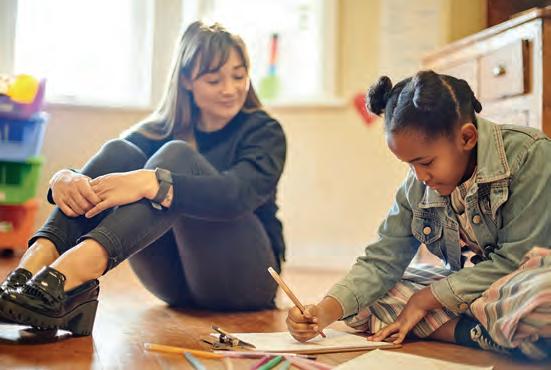
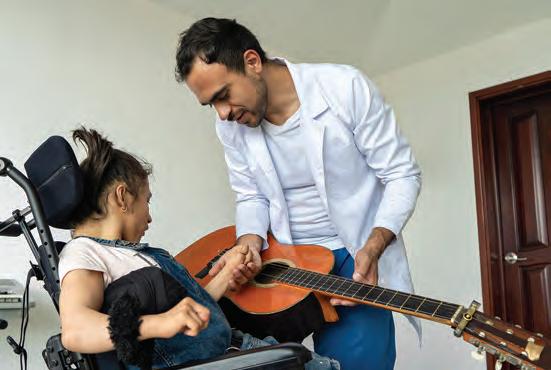
Art therapy is particularly effective for treating not only adults, but also children due to the ability of art to convey thoughts and feelings without complex verbal exchanges.
Music therapy is the clinical use of music to achieve goals like reducing stress and influencing mood and expression.
To learn more about these newly-available programs, visit the psychology and music department pages on the www.burmanu.ca website.


Jonathan Campbell, professor of New Testament Studies, successfully defended his dissertation, titled “Codex Koridethi and the Caesarean Text.”
With this completed, he will receive his PhD in New Testament studies from Dallas Theological Seminary in May.
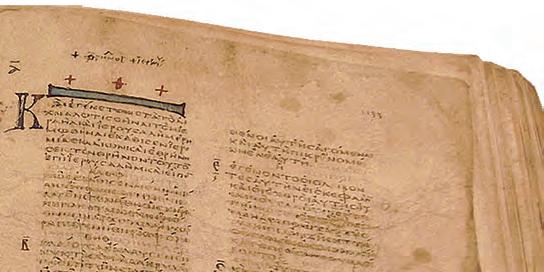
Codex Koridethi is a Greek manuscript of the Gospels, copied in the ninth or tenth century. It is located in the Republic of Georgia, and its name comes from the Koridethi monastery where it was read and studied during the Middle Ages.
New Testament scholars find value in grouping ancient manuscripts into families in order to better understand how the text of the New Testament was passed down over time. Codex Koridethi has long been associated with the Caesarean family of text, so-called because it appeared to be the prevalent text in Caesarea Philippi during the third century. Professor Campbell discovered that Codex Koridethi is not a member of the Caesarean textual family after all. Instead, it represents a conglomeration of many families of text, both ancient and medieval.
The work that Bible scholars do in researching ancient New Testament Greek manuscripts and establishing the connections they have to each other is somewhat analogous to putting together an immense and extremely complicated puzzle. Each additional piece that researchers discover leads to greater understanding and serves to build greater and greater confidence in the reliability of God’s Word.
Seventh-day-Adventist (SDA) churches across Canada will again become “laboratories” for current and prospective religious studies students this summer.
Dr. Stephane Beaulieu, chair of Burman’s religious studies program, reports that 17 students have applied to this summer’s NextGen mentoring program, a unique field experience for young men and women to work alongside experienced pastors. He adds, “This is our biggest contingent of students yet. They will be mentees for nine weeks, learning about pastoral ministry. In return, they will receive a scholarship of $8,500. Please pray for these men and women as they experience that to which they have been called.”
Leonardo Barboza, who is graduating this spring and has participated in the NextGen program over two summers, recommends this internship highly. He says that it has helped him see the practical side of pastoral ministry and that he is now ready to “see what God has planned for me next.”
The NextGen pastoral internship program is made available through Burman’s partnership with local churches, administrative entities of the SDA church, and donors.
Podcast “Amid the Odds”
Religious studies student Recardo Thompson has created a podcast with the collaboration of Burman Ministry Center (BMC). “Amidst the Odds: Between the Alpha and Omega” is a podcast that delves into tales of triumph over adversity.
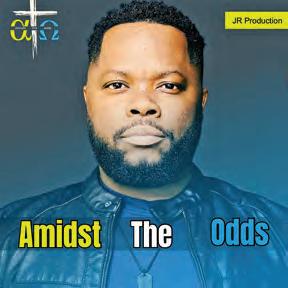
Each episode explores the resilience displayed in challenging situations, where individuals manage to succeed despite facing significant obstacles. From philosophical debates to cultural differences, host Recardo sheds light on the world’s complexities with inspiring stories and engaging discussions. Throughout it all, he uplifts Jesus Christ as the ultimate source of hope and strength.
#AmidstTheOdds #Podcast #Resilience
Each year for the past 35 years, the names of Zacker and Dora Elloway have been remembered on the campus of Burman University, both in tribute and in thanks: in tribute from their children and grandchildren, and in thanks by dozens of students who have benefitted from the scholarship established in their memory.
Married in 1925, Dora and Zacker raised a family of six boys and three girls on a farm in Saskatchewan. Though they themselves completed only the fourth grade, they were determined that their children would receive more education. So between 1945 and 1965, each of their children attended Canadian Union College (now Burman University).
child and youngest daughter, eventually took a leading role in supporting and growing the renamed Dora and Zacker Elloway Endowed Scholarship.
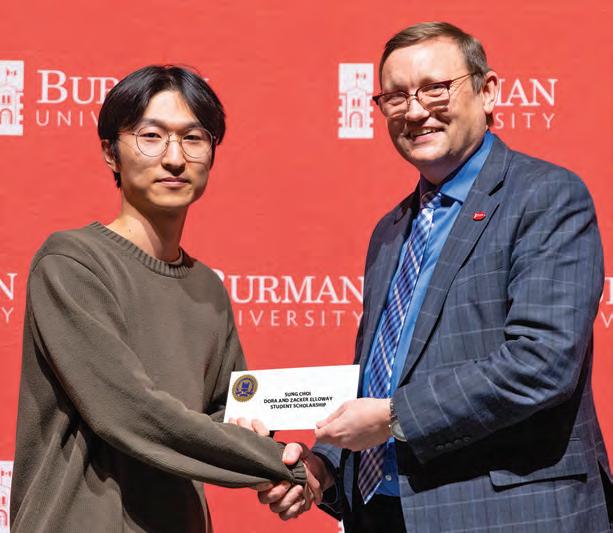
Sung
Tragedy struck the family in 1951 when their eldest daughter was killed in a car accident. Grief-stricken, Dora died two weeks later of a pulmonary embolism. Deeply saddened by these losses, Zacker and his children drew together. Dora’s deep faith, strong work ethic, and exemplary life inspired each sibling to continue pursuing a Christian education. In time, all eight surviving children became medical professionals. Many of their own children and grandchildren have also been students on the hilltop.
At their father’s death in 1988, the family established the Elloway Family Scholarship and set up a small endowment to give other young people the opportunity to study on a Christian campus. Over the years, they added to this endowment. Margaret Kaufman, Dora and Zacker’s seventh

Unlike scholarships which are supported by annual donations, the funds in an endowment are invested. Only the interest is used totally or in part at the donor’s discretion. With an endowed gift of any kind— whether for scholarships, capital projects, general needs, or other intentions —the principal amount will always remain, ensuring a steady source of income for the intended purpose.
Margaret passed away in September 2023.
She is remembered as a dedicated nurse, a loving mother, and, perhaps most notably, as a woman whose attitude about sacrifice and service was always, “We have to do more.” This attitude was demonstrated in so many ways, including her faithful stewardship of the Burman scholarship that bears her parents’ names. And so, though her life’s work is ended, it can be truly said that the work done in her lifetime, inspired by the generation before her, will continue to bear fruit for generations to come.
If you have been inspired by this story and would like to know more about establishing an endowed gift to Burman University, please contact the Advancement Office at 403.782.3381, or email Diane Southcott (dsouthcott@burmanu. ca). If you would like to make a donation of any amount to the Student Aid Endowment Fund, which is nearing $100,000 of a one-million-dollar goal, contact the Advancement Office or email Adam Deibert (adamdeibert@burmanu.ca).
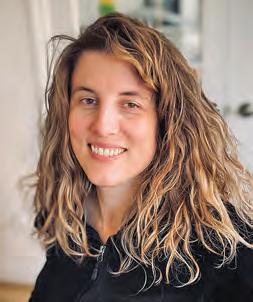
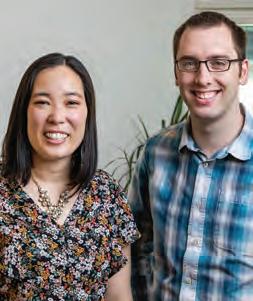
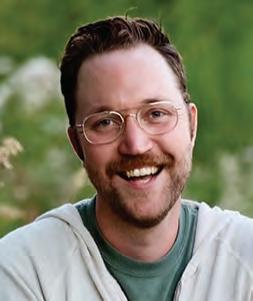
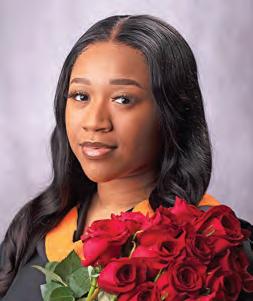
Stephanie Chipeur HS’ 02, cross-appointed to the Faculty of Law and the School of Public Policy, holds the Azrieli Accelerator Professorship in Law and Disability Policy at the University of Calgary Faculty of Law. Her current research looks at how Canadian law and policy support the dignity and wellbeing of children with disabilities.
After completing a law degree at the University of Toronto in 2009 and practicing family law in Toronto, Stephanie returned to graduate studies at McGill University in 2012. Just before commencing her doctoral program in 2014, Stephanie was injured in a car accident and became a wheelchair user. As a new member of the disability community, she began developing her expertise in disability law and policy. She completed her doctoral thesis on the law of the built environment and accessibility in 2021.
As a post-doctoral scholar, Stephanie was the first recipient of the Alberta Children’s Hospital Foundation’s Charlie Fischer Fellowship in Advancing Patient and Family-Oriented Research. This fellowship has supported Stephanie’s work on inequities in childhood disability law and policy in Canada.
Stephanie finds it concerning that parents of children who are born disabled are not financially compensated to the same extent as children who are disabled by way of injury. She says, “Our legal system, namely personal injury law, is designed to compensate for loss. But children born with disabilities receive no such compensation since they were never able-bodied in the first place.”
Stephanie’s goal is to help rectify some of these inequities. She points out that children with disabilities and their families generally don’t have the time or resources to bring about change.
Steven Klinger U ’12
After graduating from Burman in 2012 with a degree in business , Steven moved to Canmore to start work as a junior staff accountant for Baker Tilly (Collins Barrow). Within a short time, he started studying for his professional accounting designation. Two years later, he wrote and passed the Uniform Final Evaluation. This was one of his last hurdles in reaching his goal of qualifying for his Chartered Accountant designation.
In 2015 Steven was transferred to the Baker Tilly office in Revelstoke, BC and was advanced to the position of manager. Of even greater
significance was meeting Christina, also an accountant. He and Christina married in 2019, a banner year that also marked the establishment of their own accounting firm.
Sync Accounting, Chartered Professional Accountants hired its first employee late that year and, on March 1 of the following year, opened an office in downtown Revelstoke. Steven and Christina now manage a team of seven staff serving small business clients locally in Revelstoke and across Canada.
Steven writes, “I am so grateful for the time I spent on the hilltop. The life lessons I learned from so many dedicated faculty and staff have contributed greatly to my successes after graduating.”
Chris Pugh U ’15 and ’19
After graduating with a degree in Adventure Based Counselling, Chris decided to apply to Burman’s School of Education after-degree program. In 2021, his dreams to combine his two specializations were realized. He was hired by the Sunshine Coast School District (SD46) in British Columbia and writes, “I was fortunate to walk right into a high school humanities teaching position.”
Since then, Chris has taught various classes, including high school physical education, outdoor education, and some upper elementary classes.
“Since being hired,” he says, “I’ve been talking with anyone who will listen to me about wanting to work in the district’s Nature Education for Sustainable Todays and Tomorrows (NEST) program.”
With that goal in mind, Chris started the graduate program in sustainability, creativity, and innovation that is offered by Cape Breton University. His coursework has included some unusual classes such as Sustainable Happiness and Entrepreneurship for Sustainability.
Since last September, Chris has been teaching a grade 4/5 split in the NEST program. He says, “Practically speaking, the NEST program is unique because we spend at least 1.5 full days outside each week, with only rare exceptions for inclement weather. But even while indoors, we try to teach as much as we can through the lens of nature. I’m really excited about this opportunity. I feel it will perfectly blend my training in outward pursuits with my education degree. Best of all, I’m doing what I have been passionate about for seemingly forever!”
Natalie McDonald U ’22 works for a non-profit, governmentfunded employment agency in Red Deer, AB. An employment specialist at the agency’s youth program, she markets

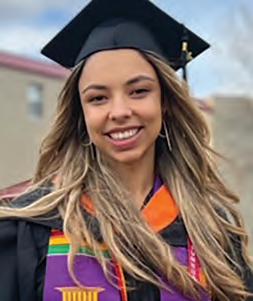

it to prospective employers and helps her clients, who are between the ages of 15 and 30, with job preparation and job searches. That includes writing effective résumés and cover letters, understanding the process of searching for a job, preparing for an interview, and marketing themselves. In short, Natalie’s clients learn how the job market works so that they will not only find a job, but also be able to hold onto it.
The best—and hardest—part of working in human services is working with people, Natalie says. Some are very goal oriented; others, not so much. But she has learned to accept and work with individual differences.
Natalie reports a deep satisfaction in being prepared and competent. She writes, “My studies in areas such as crisis intervention and positive psychology taught me to connect with people. The Sakala Centre helped me understand the ethics of using confidential information and so much more. And being on a small campus motivated me to participate in the many extracurricular activities offered.”
Back when she first decided to study psychology, she recalls people asking what she would do without a doctoral degree. They wondered about the availability of relevant jobs for someone with just a bachelor degree. The reality, she says, is that “there are plenty of
opportunities in human services within the Central Alberta area for those choosing to take a year off as well as for those deciding on a career that requires no graduate studies.”
Katelynn Mills U ’23 is consent education coordinator at Red Deer Polytechnic (RDP) in Red Deer, AB. Her one-year, grant-based position gives her the freedom to build this brand-new program from the ground up.
Among other things, Katelynn has developed course material for the class she teaches. She counsels students, presents within RDP departments, collaborates with Central Alberta’s Sexual Assault Support Centre, and accepts speaking engagements within her service area.
When asked how, as a Christian, she navigates working in a secular environment on issues of sexual consent, Katelynn explains, “I respect my own values, and I respect the values of others. I provide the information and the tools necessary for safety. At the same time, I learned to accept that people must make their own decisions. My manager is very supportive, and I love the creative freedom I am given.”
Studying at Burman University and working at the Sakala Success Centre have given Katelynn the skills and experience that helped her

Alumni, please take a few moments to tell us what's happening in your life!
Online alumni@burmanu.ca
By MailBurman University
6730 University Drive
Lacombe, AB Canada T4L 2E5
start her career. She points out that sometimes people think the classes they take are useless, but every class “taught me something that is applicable and relevant to my job now.” Her participation in her professors’ research was invaluable, as well. And the Sakala Centre at Burman gave her many opportunities to participate in training opportunities, do research, and create presentations—skills she uses daily now.
Katelynn hopes that her grant at RDP will be extended for another year or two. Then she will apply for graduate studies in social work.
Daveena Thomson U ’22 began graduate school at the University of Calgary a year after earning her degree in behavioural science at Burman. Her current three-year program is in trauma- informed clinical social work.
Many of her 400 fellow social work students are somewhat older than she, Daveena says, but she doesn’t feel at a disadvantage. She enjoys “connecting with other people who have similar interests” and has found her classmates to be “intellectually stimulating, open-minded, and accepting.”
Currently, Daveena is completing a practicum at the Sakala Success Centre at Burman as an academic counsellor. Her focus is on working with the students
individually to find appropriate and successful strategies for each. She chose Burman as her practicum site because, she explains, “I wanted to give back to a department that helped me a lot as a student. Also, my unique perspective as a recent former student myself is helpful in advocating for them.”
In addition to her practicum at Burman University, Daveena also works as a personal support worker for a youth with diverse abilities. Her longterm goal is to open her own practice and work with those who have experienced various forms of oppression, inequality, and marginalization.
When she thinks back to her student years at Burman, Daveena speaks of the value of being on a small campus: the connectedness of the students, the many friends she made, the helpfulness of her professors, the numerous activities that offered opportunities for participation and leadership, the spirituality pervading the campus environment, the welcome diversity in the student body, and more.
Like any student, Daveena encountered challenges as well. “But,” she says, “I knew Burman was where I was supposed to be at the time, and I am grateful for my experience and everything it entailed.”
On the campus of Burman University and available to the Central Alberta community, Casey’s Cabin is a popular facility for small groups. It is located in a beautiful woodland setting next to Lake Barnett and can accommodate up to 60-70 people for birthday parties, reunions, meetings, weddings, and other social events.
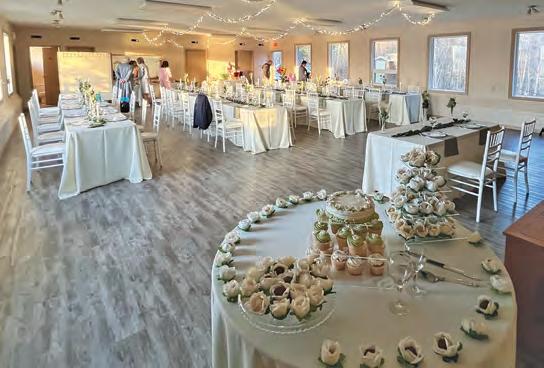
The
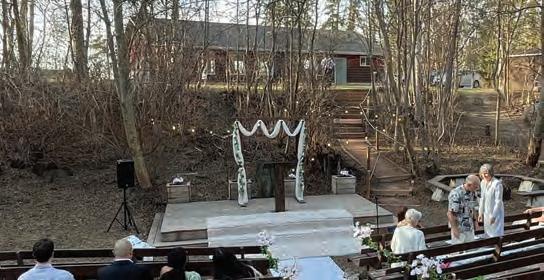

A gazebo, now under construction, will add to the beauty of the verdant surroundings come summer.
For more information and reservations
Contact Olga Sadovoy
Burman’s Physical Education Centre, 403.782.2822
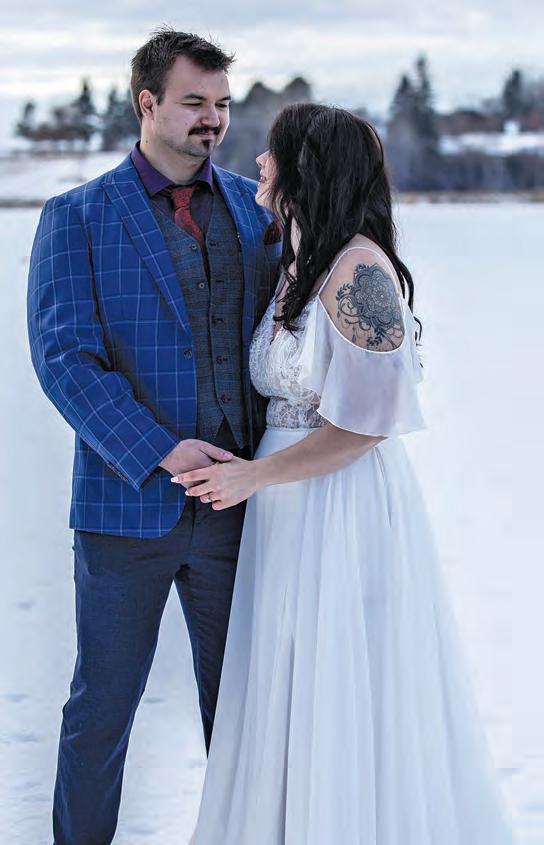
 cabin is furnished with 16 long tables, 56 lawn chairs, a piano, stove, fridge, microwave, and even pots and pans. Two washrooms and a fireplace make the cabin a perfect gathering place.
Karin (Van Gelderen) and Tanner Francoeur on December 31, 2023. Karin manages Lacombe’s The Totally Gluten Free Bakery; Tanner is a personal trainer at 360 Fitness in Red Deer.
Photo by Meagan Yager
Views of Lake Barnett are beautiful in every season.
Suitable for year-round events, the ampitheater, currently prepared for a wedding, is situated next to Casey’s Cabin.
cabin is furnished with 16 long tables, 56 lawn chairs, a piano, stove, fridge, microwave, and even pots and pans. Two washrooms and a fireplace make the cabin a perfect gathering place.
Karin (Van Gelderen) and Tanner Francoeur on December 31, 2023. Karin manages Lacombe’s The Totally Gluten Free Bakery; Tanner is a personal trainer at 360 Fitness in Red Deer.
Photo by Meagan Yager
Views of Lake Barnett are beautiful in every season.
Suitable for year-round events, the ampitheater, currently prepared for a wedding, is situated next to Casey’s Cabin.

6730 University Drive
Lacombe, AB Canada T4L 2E5
(800) 661-8129
Homecoming—it’s always a great time to remember the past. It’s also a great time to imagine exciting possibilities for the future.


Activities/Special Events
• Alumni Banquet
• Awards and Recognitions
• Sabbath Lunch Potluck
• Sunday Pancake Breakfast
• Class Photos
Honour Classes
Featured Speakers
Lowell Cooper
Contact Adam Deibert for details adamdeibert@burmanu.ca (403) 506-8773 It’s back again!
Burman University Golf Classic Sunday, June 9

Lowell and Rae Lee Cooper started their pastoral service in Alberta’s Peace River district, but Lowell was soon assigned departmental responsibilities: first, in Calgary; then, overseas in Pakistan. When he was elected department director in the Southern Asia Division, the Coopers moved to India for the next 16 years.
In 1994, Lowell was elected as an associate secretary of the General Conference with offices in Silver Spring, Maryland, USA. Four years later, he was appointed as a vice president—a role he held for almost 17 years. After 46 years of denominational employment, Lowell is now retired. But both he and Rae Lee are still heavily engaged in local church responsibilities. They live in Kennewick, Washington near their children and grandchildren.
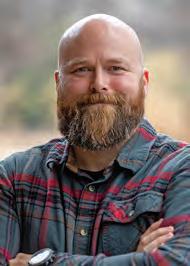
Ryan Hodgins
From personal struggles to finding hope in Jesus, Ryan Hodgins understands the transformative power of faith. With an infectious enthusiasm, he invites everyone to explore the joyous message of Christ. Pastor Hodgins is the lead pastor of Pursuit Worship, a youngadult-focused church in Charlotte, North Carolina. He is also a loving husband, a doting father to three wonderful daughters, and a proud graduate of Andrews University with a Master of Divinity, a Bachelor of Arts in Theology from Burman University, and a high school diploma from Parkview Adventist Academy. When he’s not preaching, you might catch him cheering for the Oilers, gearing up for a triathlon, or woodworking in his shop.